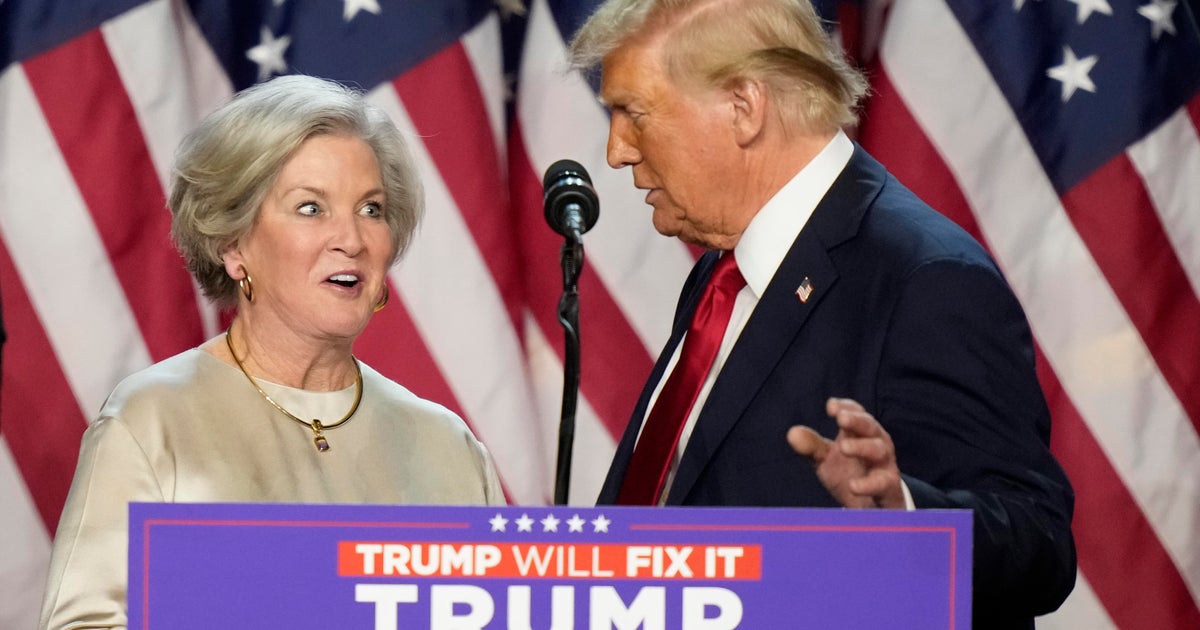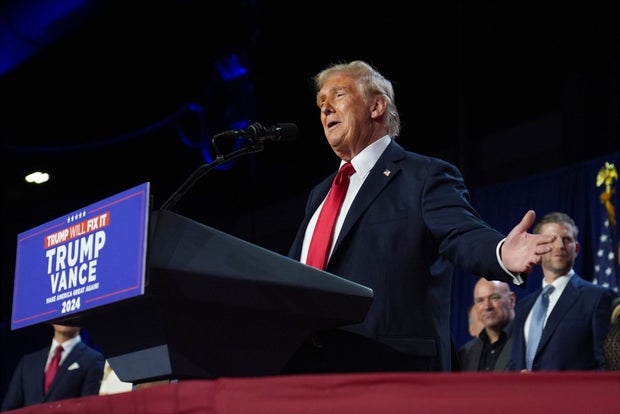CBS News
Can Trump run again in 2028? Get the details on term limits for presidents

President-elect Donald Trump’s defeated Vice President Kamala Harris in the 2024 presidential election, and although he ran for president three times, this is the last term he can serve.
The Constitution rules that even if the terms aren’t consecutive, a person can only hold the office of the president twice.
Here’s everything to know about presidential term limits.
How many terms can someone serve as president?
A person can serve two four-year terms as president, as outlined in the Constitution’s 22nd Amendment. The terms do not have to be consecutive.
A vice president who serves as president can run for two terms after that service if they held the office of president for less than two years. So if a vice president took the office of president one year into a term, they could only run for office one more time. If they took power in the back half of the term, they could be elected to the presidency twice. In recent history, President Lyndon Johnson took over in 1963 when President John F. Kennedy was killed, making him eligible to run in 1964 and 1968. He ultimately opted not to run in 1968, although he was in the race until after the New Hampshire primary.
The two terms don’t need to be consecutive: Until Trump’s victory this week, Grover Cleveland was the only president to serve non-consecutive presidential terms.
But this means that Donald Trump, who was elected to office in 2016 and in 2024, cannot be elected president again in 2028.
Evan Vucci / AP
Has anyone been president for more than two terms?
Only one person has served more than two terms as president: Franklin D. Roosevelt. He was the longest-sitting president in United States history, serving from 1933 to 1945.
That third term led to controversy, according to the National Constitution Center. The nation’s first president, George Washington, had established a precedent of only two terms in office per president, and some saw Roosevelt’s break from tradition as a threat to democracy.
In 1947, Congress approved the 22nd amendment. The amendment was ratified in February 1951.
How many times can someone run for president?
There’s no limit to how many times someone can run for president.
There have been more than a few perennial candidates for president throughout American history. Harold Stassen, a former governor of Minnesota, ran for president as a Republican candidate nine times between 1944 and 1992. Lyndon LaRouche ran for president in eight consecutive elections between 1976 and 2004 — once as the candidate for the U.S. Labor Party, which he had founded, and seven times as a candidate for the Democratic party.
What Trump has said about term limits
Trump has made a number of comments about term limits and his time in office, although it’s unclear if he was serious. In July, he repeatedly told attendees at a conservative Christian event that they wouldn’t “have to vote anymore” if he was elected to office in 2024. Some saw the comments as a threat to not leave office after a second term.
“Christians, get out in vote. Just this time,” he said during a speech at the Believers’ Summit, an event hosted by the conservative advocacy group Turning Point Action. “You won’t have to do it anymore. Four more years. You know what? It’ll be fixed. It’ll be fine. You won’t have to vote anymore, my beautiful Christians.”
Trump continued: “I love you Christians and I’m a Christian. I love you, you got to get out and vote. In four years, you don’t have to vote again. We’ll have it fixed so good, you’re not going to have to vote.”
Trump has mentioned the idea of a third term more than once. In August 2020, he said he would win that election and then “go another four years” because “they spied on my campaign,” according to Forbes. A month later, he told crowds he would “negotiate” more time in office, saying that he was “probably entitled to another four after (2020)” based on “the way we were treated.”
In April 2024, Trump told Time magazine that he intends “to serve four years and do a great job” and “wouldn’t be in favor” of an extended term, but during a 2024 speech for the National Rifle Association, Trump asked supporters if he would be considered “three-term or two-term.”
Since losing the 2020 election, Trump repeatedly falsely claimed that he had won.
CBS News
Trump picks Susie Wiles as White House chief of staff, first woman ever in the role

President-elect Donald Trump announced late Thursday that his campaign co-chair Susie Wiles will serve as his White House chief of staff come January, the first woman to ever hold that position.
“Susie Wiles just helped me achieve one of the greatest political victories in American history, and was an integral part of both my 2016 and 2020 successful campaigns,” Trump said in a statement. “Susie is tough, smart, innovative, and is universally admired and respected. Susie will continue to work tirelessly to Make America Great Again. It is a well deserved honor to have Susie as the first-ever female chief of staff in United States history. I have no doubt that she will make our country proud.”
Wiles is known as a formidable political operative who prefers to work behind the scenes, rather than on camera. Trump asked her to come to the microphone when he declared victory early Wednesday morning, and she declined, preferring to stay out of the spotlight.
Wiles has managed to not just curry but, more critically, keep Trump’s favor while working in a high-profile campaign role, managing the ambitions, personalities and egos in Trump’s orbit.
Wiles used to work for Florida Gov. Ron DeSantis, helping secure the governor’s office for him. But DeSantis’ relationship with her soured, and Trump world brought her into the fold. Wiles helped team Trump defeat her former boss in the Republican primaries.
Wiles’ father was the late Pat Summerall, a famous sports broadcaster. Now 67, Wiles has worked behind-the-scenes roles shaping and guiding politicians in Florida for four decades.
The chief of staff role is a demanding one that involves managing the president himself, in addition to senior White House staff, and by extension, the hundreds of people who work in the West Wing. But it also involves mapping out and executing a president’s policy objectives, ambitions and legacy.
Trump had four chiefs of staff during his first term, and parted with some of them on uncomfortable terms. Trump’s longest-serving White House chief of staff, John Kelly, has said Trump meets the definition of a fascist, and warned against a second Trump term. Reince Priebus, Mark Meadows and Mick Mulvaney also served in the role, although Mulvaney was only ever an acting chief of staff.
contributed to this report.
CBS News
Trump taps Susie Wiles as White House chief of staff

Watch CBS News
Be the first to know
Get browser notifications for breaking news, live events, and exclusive reporting.
CBS News
Canada shuts down TikTok’s Canadian offices, but allows app to remain

Canada announced Wednesday it won’t block access to the popular video-sharing app TikTok but is ordering the dissolution of its Canadian business after a national security review of the Chinese company behind it.
Industry Minister François-Philippe Champagne said it is meant to address risks related to ByteDance Ltd.’s establishment of TikTok Technology Canada Inc.
“The government is not blocking Canadians’ access to the TikTok application or their ability to create content. The decision to use a social media application or platform is a personal choice,” Champagne said.
Champagne said it is important for Canadians to adopt good cybersecurity practices, including protecting their personal information.
He said the dissolution order was made in accordance with the Investment Canada Act, which allows for the review of foreign investments that may harm Canada’s national security. He said the decision was based on information and evidence collected over the course of the review and on the advice of Canada’s security and intelligence community and other government partners.
A TikTok spokesperson said in a statement that the shutdown of its Canadian offices will mean the loss of hundreds of local jobs.
“We will challenge this order in court,” the spokesperson said. “The TikTok platform will remain available for creators to find an audience, explore new interests and for businesses to thrive.”
TikTok is wildly popular with young people, but its Chinese ownership has raised fears that Beijing could use it to collect data on Western users or push pro-China narratives and misinformation. TikTok is owned by ByteDance, a Chinese company that moved its headquarters to Singapore in 2020.
TikTok faces intensifying scrutiny from Europe and America over security and data privacy. It comes as China and the West are locked in a wider tug of war over technology ranging from spy balloons to computer chips.
Canada previously banned TikTok from all government-issued mobile devices. TikTok has two offices in Canada, one in Toronto and one in Vancouver.
Michael Geist, Canada research chair in internet and e-commerce law at the University of Ottawa, said in a blog post that “banning the company rather than the app may actually make matters worse since the risks associated with the app will remain but the ability to hold the company accountable will be weakened.”
Canada’s move comes a day after the election in the United States of Donald Trump. In June, Trump joined TikTok, a platform he once tried to ban while in the White House. It has about 170 million users in the U.S.
Trump tried to ban TikTok through an executive order that said “the spread in the United States of mobile applications developed and owned” by Chinese companies was a national security threat. The courts blocked the action after TikTok sued.
Both the U.S. FBI and the Federal Communications Commission have warned that ByteDance could share user data such as browsing history, location and biometric identifiers with China’s government. TikTok said it has never done that and would not, if asked.
Trump said earlier this year that he still believes TikTok posed a national security risk, but was opposed to banning it.
U.S. President Joe Biden signed legislation in April that would force ByteDance to sell the app to a U.S. company within a year or face a national ban. It’s not clear whether that law will survive a legal challenge filed by TikTok or that ByteDance would agree to sell.







